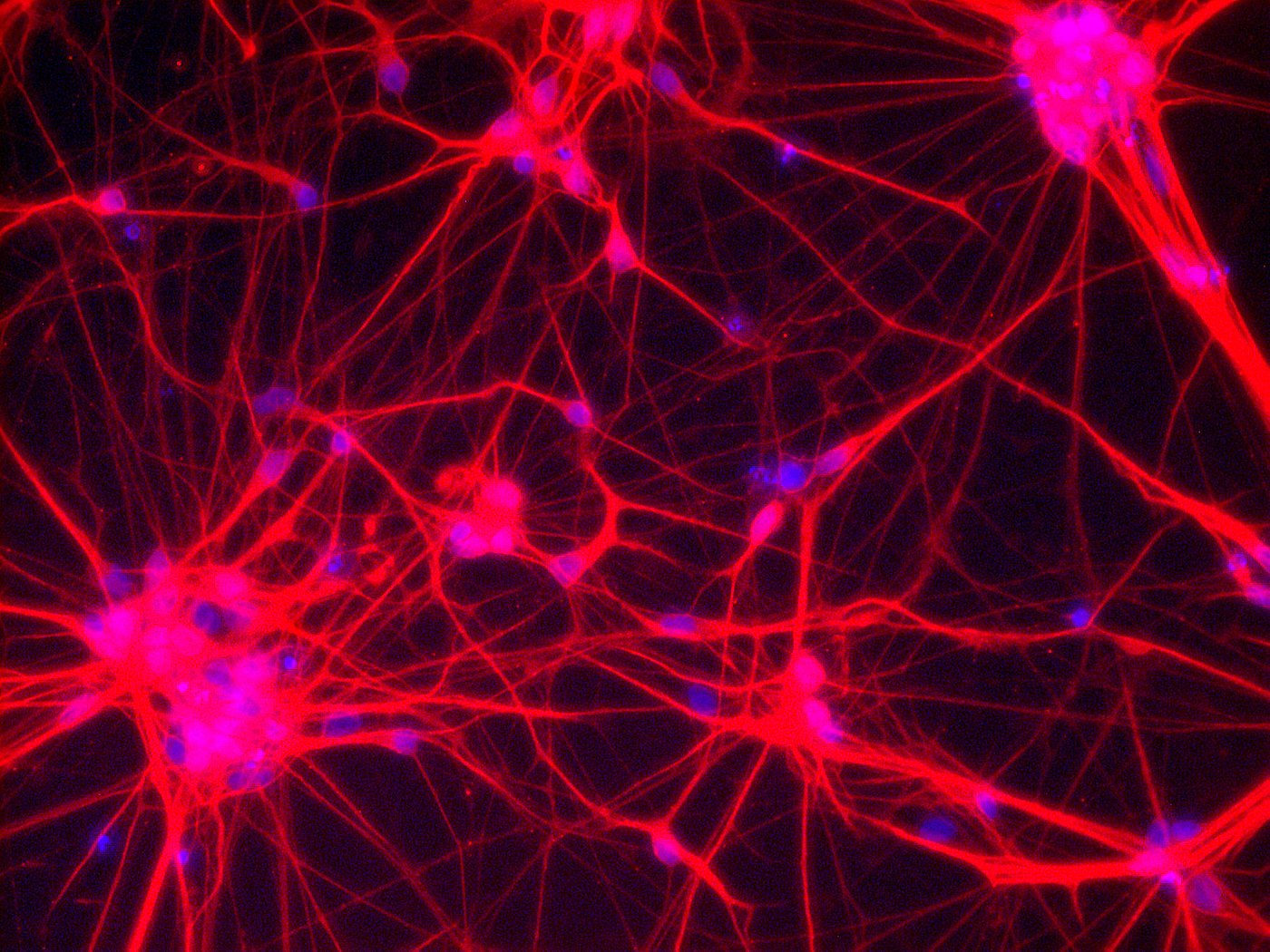
Neurons – Network of neuronal cells (Blue: nucleus; Red: neurons) [Copyright: Institute for Transfusion Medicine, UK Essen]
Professor Dr. Bettina Schöne-Seifert has held the Chair of Medical Ethics at the Westfälische Wilhelms-Universität Münster since 2003. She was appointed to the German Ethics Council in 2001 and remained a member until 2010. She was elected a member of the Leopoldina in 2009.
In early September 2018, Prof. Dr. Schöne-Seifert was elected as a new member of the board of the recently founded “Stammzellnetzwerk.NRW” (Stem Cell Network NRW), which will seamlessly continue the tasks of the previous Stem Cell Network North Rhine-Westphalia (‘Kompetenznetzwerk Stammzellforschung NRW’) from 2019 onwards.
We interviewed Ms. Schöne-Seifert to introduce her to you.
Could you briefly present your scientific profile to our readers?
I'd love to: I am a licensed physician with a doctorate (a rather elaborate experimental one from Max Planck) and about three years of clinical work), but I turned towards philosophy and medical ethics quite early on. I completed a master's degree in Biomedical Ethics at Georgetown University in Washington, DC and then worked in this field at the Institute of Philosophy of the University of Göttingen, at the ‘Institute for Advance Study, Berlin’, at the Center for Ethics of the University of Zurich and at the Center for Ethics and Philosophy of Science at the University of Hanover. Finally, in 2000 I qualified for a PhD at the Faculty of Philosophy of the Georg-August-Universität Göttingen.
My work focuses on medical ethics and ranges from theoretical questions of ethical reasoning to a broad range of concrete application problems. For example, I have been involved in debates about dealing with prenatal human life (PGD, embryo research), organ transplantation, brain death, decisions at the end of life (e.g. physician assisted suicide), distributive justice in health care, or alternative medicine. And there's still a lot more to do!
Which aspects of stem cell research are of particular interest to you and in which contexts have you dealt with the topic so far?
I find a great deal of what happens in basic and clinical research exciting, not least in the combination of stem cell and gene editing research. My own view of this area naturally focuses on normative issues: debates on the status of the embryo, on reproductive and genetic ethics, and on corresponding research bans or permits.
In future, the Stem Cell Network NRW (‘Stammzellnetzwerk.NRW’) wants to focus even more on the translation of research results. Where do you see the great challenges of translation in the coming years?
Ethically speaking: (i) In adequate governance, control, and supervision of experimental therapies, as well as good information on such therapies - as with all clinical innovations. (ii) In facilitating promising preclinical and clinical stem cell projects - not least by revising the German Stem Cell Act (outdated deadline, research reservation) and the German Embryo Protection Act. This requires informed ethical discourse. (iii) In improving biological and medical education (health literacy) in the population. It is evident that parts of the public are depressingly ignorant!
How can the inter- and transdisciplinary dialog maintained in the Stem Cell Network NRW help the research field?
In all the above points (and many others): promote mutual and multi-perspective understanding. For me personally: Well-applied ethics requires a high level of factual knowledge. What are the realistic hopes of current stem cell research? What are the supposed wrong tracks? What about the structural conditions - financing, regulation, promotion of young talent - in our country? Has German 'bioconservativism' caused any damage here? These are all topics I am looking forward to investigating further.
If you were granted a wish with regard to stem cell research, you would wish for ...
…stem cell-based clinical success to be achieved quickly, such as the promising developments emerging for patients with haemoglobinopathies, muscle atrophy, Parkinson's disease or type 1 Diabetes.
What I want to do outside of science ...
…carry on as before: Be involved in the lives of my husband and our four children; enjoy my horse, our friends, books and much more...